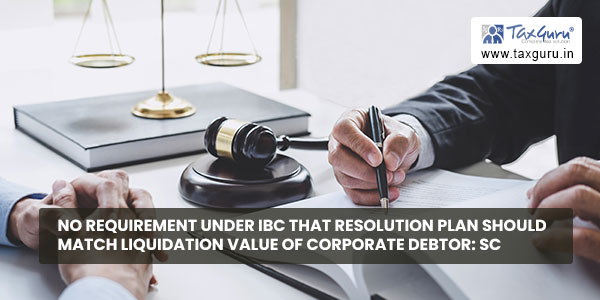No requirement under IBC that resolution plan should match liquidation value of corporate debtor: SC
Maharasthra Seamless Ltd. vs. Padmanabhan Venkatesh (Supreme Court)
Supreme Court Rule That The liquidation value of assets can be higher than the bid under the corporate insolvency resolution process.
The Supreme Court in a significant judgment concerning provisions of the Insolvency and Bankruptcy Code (IBC), 2016 made it clear that it is not necessary that bid of any resolution applicant has to be matched with the liquidation value of the assets.
The liquidation value of assets can be higher than the bid under the corporate insolvency resolution process under the IBC.
In this case, Indian Bank initiated a corporate insolvency resolution process against the United Seamless Tubulaar Private Limited. At the end of the process, Maharashtra Seamless Limited (MSL) was declared a successful resolution applicant.

The Adjudicating Authority, the National Company Law Tribunal, Hyderabad Bench (NCLT), on January 21, 2019 approved MSL’s resolution plan, which among other things involved an upfront payment of Rs 477 crores. While approving the resolution plan, the NCLT said that it met all the requirements of Section 30(2) of the Code which primarily deals with payment to creditors.
Not satisfied with the order, corporate debtor Padmanabhan Venkatesh and Indian Bank moved the National Company Law Appellate Tribunal (NCLAT). The appellants wanted the MSL to increase the upfront payment to creditors to Rs 597.4 crore, which was the liquidation value.
The NCLAT upheld the appeal and asked the MSL to deposit an additional sum failing, which the resolution plan would be set aside.
The MSL moved the Supreme Court against the order of the NCLAT.
The Supreme Court’s ruling
The main issue before the Supreme Court was whether the bid amount under the resolution plan should necessarily match the liquidation value.
“No provision in the Code or Regulations has been brought to our notice under which requires the bid of any Resolution Applicant to match with liquidation value arrived at in the manner provided in Clause 35 of the Insolvency and Bankruptcy Board of India (Insolvency Resolution Process for Corporate Persons) Regulations, 2016,” the Supreme Court said.
The object behind prescribing such a valuation process, the apex court added, was to assist the Committee of Creditors (CoC) to decide on a resolution plan properly.
“Once, a resolution plan is approved by the CoC, the statutory mandate on the Adjudicating Authority under Section 31(1) of the Code is to ascertain that a resolution plan meets the requirement of sub-section (2) and (4) of Section 30 thereof.
We, per se, do not find any breach of the said provisions in the order of the Adjudicating Authority in approving the resolution plan,” the Supreme Court observed while allowing the appeal.





